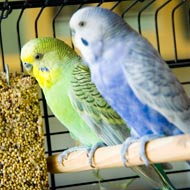
Public Health England advises on signs of infection
A case of psittacosis, which primarily affects birds, has been confirmed in a bird keeper from Bristol.
Public Health England (PHE) is making owners aware of signs to look out for in birds and themselves.
Each year between 25 and 50 cases of psittacosis are laboratory confirmed in England and Wales. It most commonly affects parrots, parakeets, budgerigars, cockatiels, pigeons and doves. Ducks and turkeys may be affected but the infection is seen less frequently in chickens.
Birds may carry the organism without showing signs of disease, or display mild to severe illness including sleepiness, shivering, weight loss, breathing problems and diarrhoea.
The disease can be passed from birds to humans through airborne particles from feather dust, dried faeces or respiratory secretions. It can also be transmitted through handling the plumage and tissues of infected birds.
At most risk of contracting the disease are bird keepers and fanciers or those whom are exposed to infected birds through their occupation - for example vets, pet shop workers, wildlife and zoo workers and poultry slaughter-house employees.
In humans, it causes flu-like symptoms including fever, headaches and muscle aches, but can result in severe pneumonia and other non-respiratory health issues. Signs typically appear after 10 days though they may be seen within four to 30 days after exposure.
“Members of the public who may have come into contact with birds need to be assured that severe illness as a result of infection from this bacteria is rare," said Mike Wade from PHE South West, in a statement published on South Gloucestershire Council's website.
"However, it is important that those individuals are aware of signs and symptoms and discuss any concerns they may have with their GP."
Residents living close to the recently diagnosed individual have been informed and advised of necessary actions to undertake by Bristol City Council.
Anyone with concerns about birds purchased between 28 May and 3 June have been advised to contact their vet for advice.
For more information on psittacosis visit: https://www.gov.uk/psittacosis



 HMRC has invited feedback to its communications regarding the employment status of locum vets and vet nurses.
HMRC has invited feedback to its communications regarding the employment status of locum vets and vet nurses.